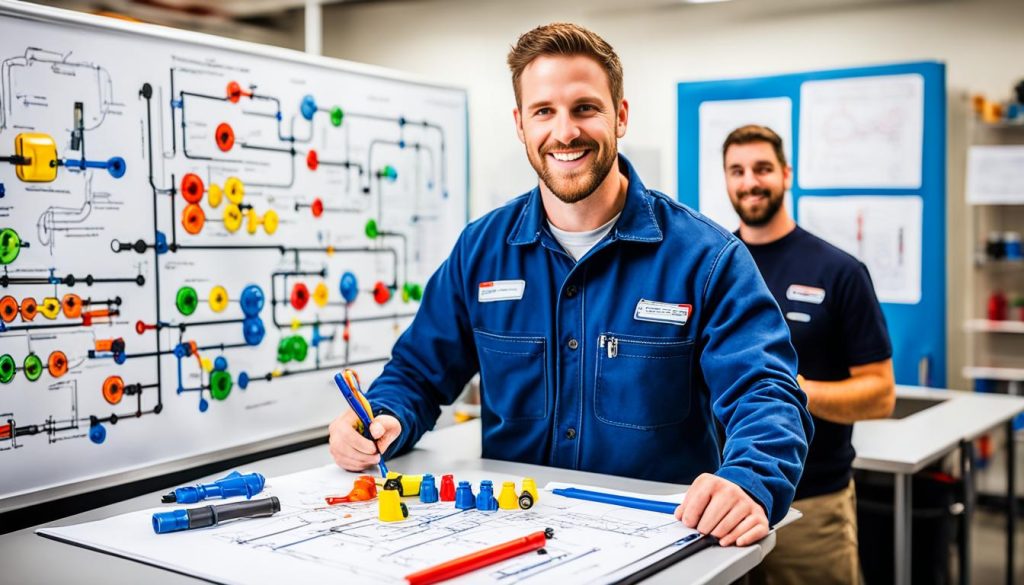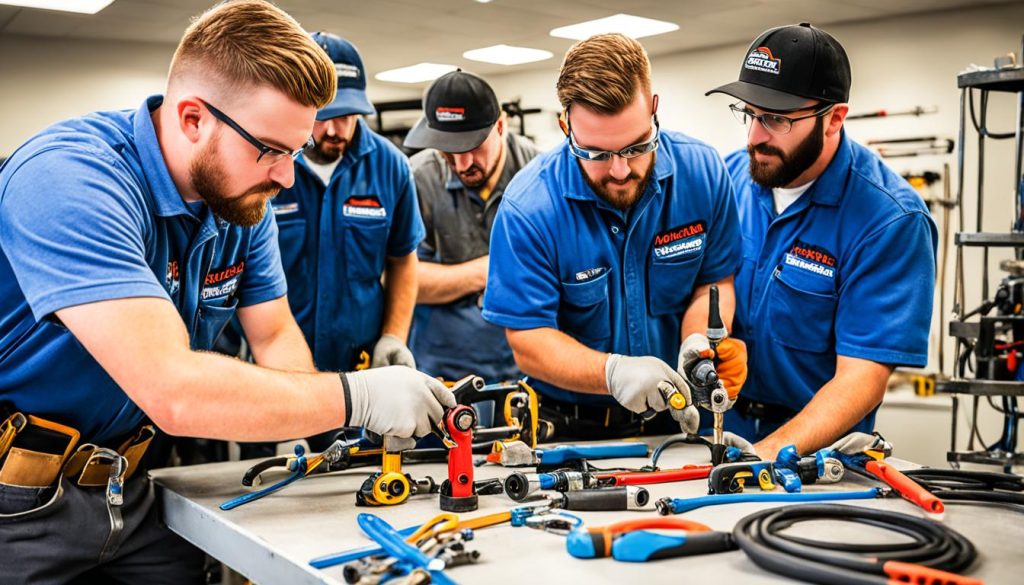Begin a Plumbing Career: Steps & Tips
Did you know that plumbing is one of the most in-demand career choices in Canada? With the increasing need for skilled professionals in the construction industry, plumbers enjoy job security, competitive salaries, and the opportunity to work on a wide range of tasks each day. If you’re looking for a dynamic and rewarding career, becoming a plumber could be the perfect path for you.
Key Takeaways:
- Plumbing is an in-demand career choice in Canada.
- Plumbers enjoy job security and competitive salaries.
- Becoming a plumber offers the opportunity to work on diverse tasks.
What Do Plumbers Do?
Plumbers play a crucial role in maintaining the functionality of water supply lines and drainage systems in both residential and commercial buildings. Their responsibilities extend beyond just fixing leaky pipes; they are responsible for ensuring the proper installation and repair of plumbing systems. Here are some of the tasks that plumbers handle on a regular basis:
- Installing and repairing water supply lines
- Fixing faucets, toilets, and drainage lines
- Inspecting and maintaining plumbing systems
- Identifying and resolving plumbing issues
- Collaborating with clients to understand their plumbing needs
Plumbers must possess a strong skill set to excel in their field. This includes physical strength, good dexterity, problem-solving abilities, and knowledge of safety protocols and local plumbing codes. Whether they work for established plumbing companies or run their own businesses, plumbers are in high demand due to the essential nature of their work.
Plumbing Job Requirements:
- Physical strength to perform tasks that involve heavy lifting and manual labor.
- Good dexterity and hand-eye coordination for precise installation and repairs.
- Problem-solving skills to troubleshoot and find effective solutions to plumbing issues.
- Knowledge of safety protocols to ensure the well-being of themselves and others.
- Familiarity with local plumbing codes and regulations to comply with standards.
Plumbing Trade School:
Gaining the necessary skills and knowledge to become a plumber often requires formal education from a plumbing trade school. These schools provide comprehensive training programs, teaching aspiring plumbers the fundamentals of the trade. By enrolling in a plumbing trade school, individuals can acquire the essential theoretical knowledge and practical experience needed to succeed in the field.
Is the Plumbing Field Right for You?
Before embarking on a plumbing career, it’s important to assess whether this field is the right fit for you. Plumbing requires specific skills and qualities that contribute to success in the industry. Here are some factors to consider:
Enjoy working with your hands and in a team environment
Plumbers spend a significant amount of time working with their hands, using various tools and equipment to install and repair plumbing systems. If you have a natural inclination towards hands-on work and collaborating with others in a team environment, then plumbing may be a suitable career choice for you.
Good time management skills
Plumbers often juggle multiple projects and tasks throughout the day. Having good time management skills ensures that you can effectively prioritize and complete assignments in a timely manner. This skill is crucial in delivering satisfactory results and meeting client expectations.
Ability to handle physically demanding tasks
Plumbing work can be physically demanding, requiring strength, stamina, and mobility. Whether it’s lifting heavy equipment, bending in tight spaces, or working in challenging weather conditions, being physically fit and able to handle such tasks is essential for a successful career as a plumber.
Trade school programs and apprenticeships
To gain the necessary training and education for a plumbing career, trade school programs and apprenticeships are highly recommended. These programs provide hands-on experience, theoretical knowledge, and industry-specific training. They equip aspiring plumbers with the skills and expertise required to excel in the field.
Trade school programs:
| Program Name | Duration | Institution |
|---|---|---|
| Plumbing Techniques Diploma Program | 1 year | ABC Trade School |
| Plumbing Apprenticeship Program | 4 years | XYZ Institute of Technology |
| Plumbing Co-op Apprenticeship Diploma Program | 2 years | 123 Technical College |
These programs provide a comprehensive foundation in plumbing knowledge and skills. They cover topics such as piping systems, plumbing codes and regulations, blueprint reading, and safety procedures.
To further enhance your training, apprenticeships provide hands-on experience under the guidance of experienced plumbers. This combination of theoretical learning and practical application is invaluable in developing your skills and preparing you for a successful plumbing career.
A Day in the Life of a Plumber
As a plumber, my day is filled with a wide range of tasks, making each day unique and interesting. From consulting with customers to inspecting plumbing issues, my goal is to provide efficient and effective solutions. Let’s dive into a typical day in the life of a plumber.
Consultation and Inspection
Every day begins with consultations with customers. I take the time to listen to their concerns, ask questions, and determine the best course of action. This helps me understand the plumbing issue at hand and develop a plan for resolving it.
Once I have gathered all the necessary information, I move on to inspecting the plumbing system. This involves identifying the root cause of the problem and assessing the overall condition of the pipes, fixtures, and other components. Inspection is a crucial step in determining the most effective solution and preventing future issues.
Ordering Supplies
After identifying the problem and understanding the required repairs, I proceed to order the necessary supplies. This could include pipes, valves, fittings, or any other plumbing materials needed to complete the job. Timely procurement is essential to ensure a smooth workflow and minimize any delays.
Working Hours and Emergencies
Plumbers typically work between 8-10 hours a day, depending on the workload. However, emergencies can occur at any time, so being on-call is a regular part of the job. I am prepared to respond quickly to urgent plumbing issues outside of regular working hours.
Administration and Paperwork
As a plumber, there is also administrative work to be done. This includes documenting the work performed, generating invoices for customers, and ensuring all necessary paperwork is completed accurately. Attention to detail is crucial to maintain organized records and ensure smooth operations.
Dedication and Customer Service
Throughout the day, I prioritize providing exceptional service to my customers. This involves not only fixing their plumbing problems but also offering guidance and advice to prevent future issues. I strive to be punctual, respectful, and dedicated to ensuring their satisfaction.
In conclusion, being a plumber is a rewarding profession that requires a combination of technical skills, problem-solving abilities, and excellent customer service. The day-to-day tasks may vary, but the dedication to delivering high-quality plumbing services remains consistent.
Education Requirements and Apprenticeships
To become a plumber, you need to complete postsecondary education, typically in the form of trade school programs. High school education or equivalent is the minimum requirement to apply to trade school.
There are several options available for aspiring plumbers to gain the necessary knowledge and skills. One option is a one-year certificate program, which provides focused training in various plumbing techniques and systems. Another option is a co-op apprentice diploma program, which combines in-class learning with on-the-job training. This type of program allows you to gain practical experience while studying the theoretical aspects of plumbing.
Completing an apprenticeship is a crucial step in becoming a certified plumber. Apprenticeships involve a combination of work experience and in-class hours, giving you the opportunity to apply what you’ve learned in a real-world setting. During your apprenticeship, you will work under the guidance of experienced plumbers, honing your skills and gaining valuable hands-on experience.
By successfully completing a trade school program and an apprenticeship, you will be well on your way to obtaining your plumbing certification and starting a rewarding career as a plumber.
Get Certified
Once you have completed the necessary training and apprenticeship hours, the next step to becoming a professional plumber is to apply for your certification exam. This exam is designed to evaluate your knowledge of workplace tasks, problem-solving abilities, and understanding of plumbing theory.
Successfully passing the certification exam will grant you a full certificate of qualification, which is essential for establishing your reputation and enhancing your employability as a skilled plumber. It showcases your expertise and dedication to the plumbing profession.
To broaden your career opportunities and work in multiple provinces across Canada, obtaining an Interprovincial Red Seal certification is highly recommended. This prestigious certification demonstrates your commitment to excellence in the field of plumbing and allows you to work seamlessly in different provinces without the need for re-qualification.
Source Links
- https://plumbingauthority.ca/how-to-start-career-plumbing/
- https://www.supportontarioyouth.ca/insight/how-to-become-a-plumbing-apprentice/
- https://www.monster.com/career-advice/article/pipe-systems-plumbing-careers
- Investing Wisely: How Windows & Doors in Boost Property Value and Financial Health - April 24, 2025
- The Financial Impact of Personal Injuries: Why Legal Help Matters for Business Owners - April 16, 2025
- The Hidden Financial Costs of Domestic Assault: What Business Owners Need to Know - April 16, 2025













